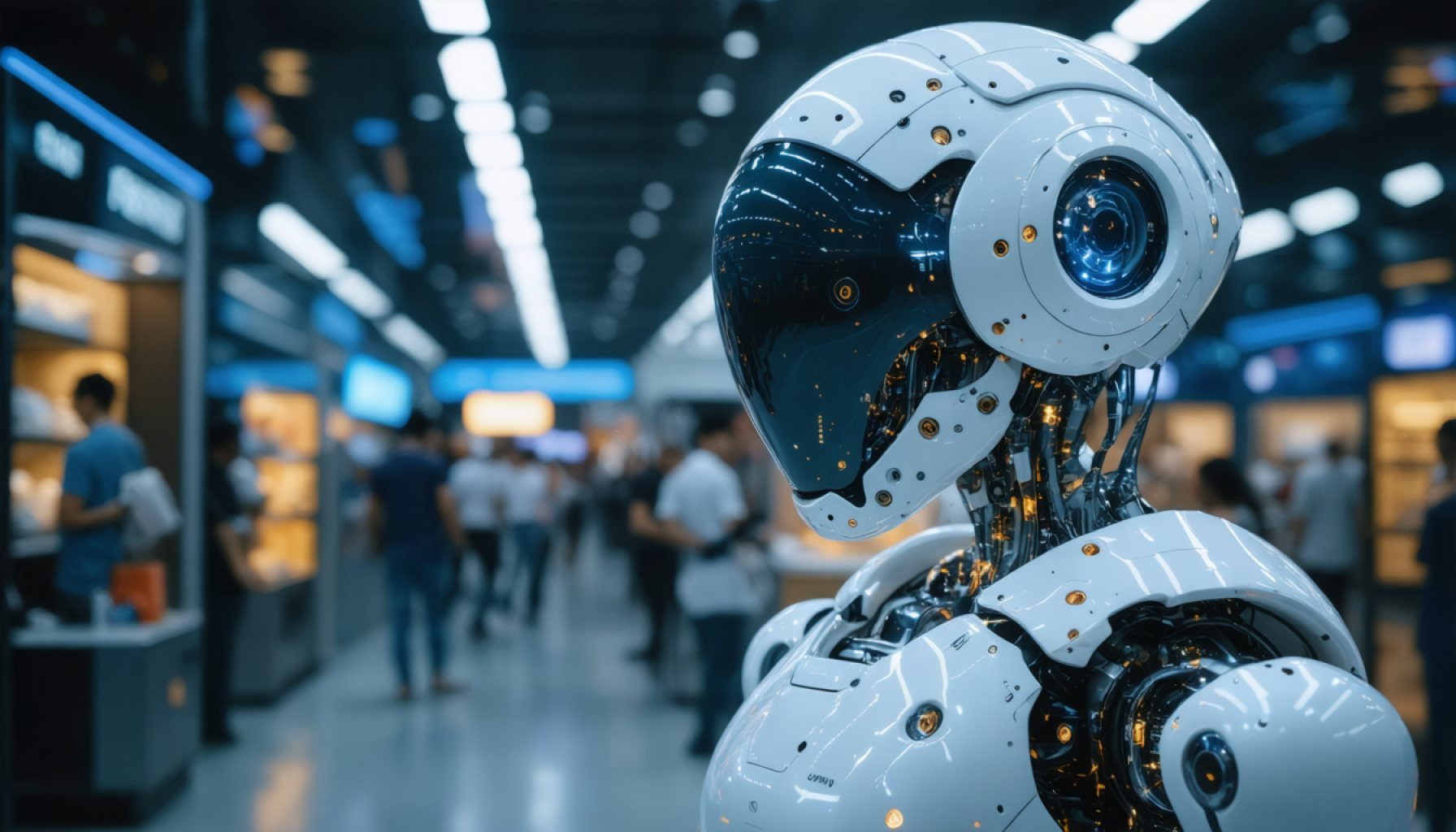- AI is transforming multiple industries, challenging long-standing leaders and creating new competitors.
- Eli Lilly’s “Orforglipron” showcases significant weight loss results, disrupting Novo Nordisk’s market dominance in obesity treatment.
- Eli Lilly’s success is attributed to an “open AI strategy,” involving collaborations with AI leaders for drug development.
- In manufacturing, LG Innotek’s fully automated “Dream Factory” in South Korea epitomizes AI and robotics synergy.
- Amazon’s “Buy for Me” AI shopping agent revolutionizes consumer experiences by sourcing and purchasing products across various platforms.
- The growing integration of AI into daily life raises questions about its role in enriching human experiences versus potential over-reliance.
A revolution unfolds across diverse industries, weaving artificial intelligence into the fabric of human progress and challenging long-standing dominions. In 2021, Novo Nordisk reached new heights by launching “Wegovy,” a groundbreaking obesity treatment that captivated global markets. However, the status quo is being upended by Eli Lilly’s emergence. Their experimental therapy, “Orforglipron,” revealed significant weight loss outcomes in Phase 3 clinical trials. The revelation sent a ripple of shock through the industry, as Novo Nordisk’s stock plummeted while Eli Lilly’s soar captivated Wall Street.
At the heart of Eli Lilly’s triumph lies its innovative embrace of an “open AI strategy.” Partnering with AI pioneers such as OpenAI, Crystal Pie, and Atomwise, the company pursued over 100 drug development projects, leveraging AI as a critical tool. In contrast, Novo Nordisk’s introspective focus on internal AI platforms reveals two distinct approaches to harnessing technology’s might in pharmaceutical realms.
In South Korea’s Gumi city, LG Innotek has sculpted the future of manufacturing. Its “Dream Factory,” sprawling three times the size of a soccer field, produces next-generation semiconductor substrates known as FC-BGA (Flip-Chip Ball Grid Array) with a 100% automation goal. This smart factory epitomizes the perfect synergy of AI and robotics, promising zero human errors, no defects, eliminating equipment failures, and eradicating safety incidents. The battlefield for tech supremacy now pits industry giants from Japan and Taiwan against this AI-driven marvel.
Meanwhile, Amazon’s development of the “Buy for Me” shopping agent signals a seismic shift in consumer experiences. Unlike its predecessor, the “Rufus,” which was limited to Amazon’s vast inventory, this AI assistant can scout external sites, recommend products, and facilitate purchases for its users. Amazon harnesses vast troves of data to teach its AI to deliver personalized customer service. It’s a world where AI intimately understands the preferences of every user, eroding the boundaries of traditional commerce.
As AI’s reach extends deeper into our routines, the question arises: will we command AI to enrich our lives, or will we surrender to its omnipresence? Humans grapple with the shifting sands of what constitutes a life well-lived, discerning the balance between embracing AI’s potential and guarding against its dominance. The choice lies at the crossroads of this digital revolution, redefining the essence of humanity in a swiftly evolving landscape.
The AI Revolution: Transformative Trends in Pharmaceuticals and Beyond
Eli Lilly’s AI Embrace vs. Novo Nordisk’s Traditional Approach
Eli Lilly’s groundbreaking success with Orforglipron in the obesity treatment market highlights a pivotal shift in strategic approaches between pharmaceutical giants. By partnering with leading AI pioneers like OpenAI, Eli Lilly harnesses cutting-edge technological innovation to accelerate drug development. This contrasts starkly with Novo Nordisk’s traditional internal AI initiatives.
Expert Insight on AI in Pharma
Experts argue that leveraging AI can reduce drug development times by years and significantly cut costs (Accenture). With AI, pharmaceutical companies can more efficiently identify promising compounds, conduct simulations, and predict potential side effects before clinical trials begin.
LG Innotek’s Automated Future
LG Innotek’s “Dream Factory” in Gumi, South Korea, represents a leap forward in smart manufacturing. With a goal of 100% automation, it utilizes AI and robotics to ensure flawless production of semiconductor substrates (FC-BGA). This highlights a broader trend in tech manufacturing, where companies worldwide aim to minimize human error and enhance efficiency through AI-driven processes.
Real-World Impact
For industries like automotive and electronics that rely on semiconductors, LG Innotek’s advancements promise a future of reduced production costs and faster delivery times, thus fueling further innovation and growth.
Amazon’s “Buy for Me” AI Shopping Agent
Amazon’s “Buy for Me” shopping agent signifies a fundamental shift in e-commerce. This AI assistant extends beyond Amazon’s own inventory, assisting users in purchasing products from other sites, creating a more seamless shopping experience.
How to Maximize “Buy for Me”
– Personalization: Customize the agent’s settings to follow your shopping and browsing habits for tailored recommendations.
– Budget Tools: Use built-in features to set spending limits and alerts for deals within those parameters.
– Security Preferences: Ensure secure connections for external purchases by monitoring purchase pathways through Amazon’s interface.
Market Forecasts & Industry Trends
The integration of AI in various sectors is set to grow exponentially. According to a report by Grand View Research, the AI market is expected to reach USD 1,081.78 billion by 2028, driven by increasing acceptance of AI technologies in sectors like healthcare, automotive, and retail.
Key Predictions:
– Healthcare: AI implementation will streamline diagnostic procedures and patient care, empowering personalized medicine.
– Retail: Enhanced algorithms will refine supply chains and consumer experiences, edging closer to predictive purchasing—anticipating what consumers need before they do.
Actionable Recommendations
As AI continues to reshape industries, individuals and businesses must stay informed and adaptable. Here are quick tips to leverage AI effectively:
– Continuous Learning: Invest in upskilling and reskilling efforts focusing on AI capabilities to remain competitive in your industry.
– Data Utilization: Collect and analyze data to enhance personal or business decision-making processes.
– Collaborative Innovation: Partner with AI experts or platforms to explore new opportunities for growth and efficiency.
In conclusion, the AI-driven transformations happening in pharmaceuticals, manufacturing, and e-commerce promise an exciting future. By adopting and adapting these emerging technologies, both companies and individuals can thrive in this digital revolution.
For more insights on artificial intelligence and its wide-ranging applications, visit OpenAI or Accenture.





